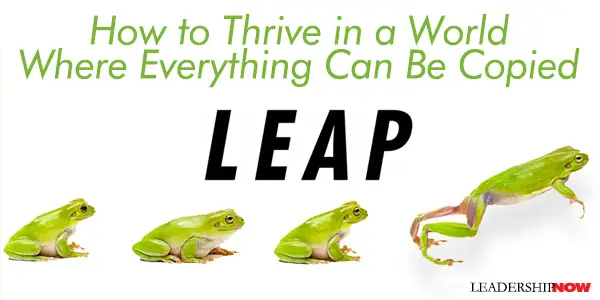 |
 |
08.14.18

Leap: How to Thrive in a World Where Everything Can Be Copied
I Howard Yu explains in Leap: How to Thrive in a World Where Everything Can Be Copied, how a business can shield itself from copycats. (The stories are absorbing and alone are worth the price of the book.)
Principle 1: Understand your firm’s foundational knowledge and its trajectory
What is the core knowledge discipline that is most fundamental to your company and how widely available is it? Principle 2: Acquire and cultivate new knowledge disciplines
Two forces—the unwillingness to cannibalize current sales and the tendency to leverage what we have today—leads firms to give their advantage away to copycats. As P&G chairman William Cooper Proctor said in 1933, “This [synthetic detergent] may ruin the soap business. But if anybody is going to ruin the soap business it had better be Procter & Gamble.” When making the leap timing is important. Steve Jobs said, “Things happen fairly slowly.” Yu writes, “This is an important lesson. Successful executives often exhibit a bias for action. But it’s even more important to separate the noise from the signal that actually pinpoints the glacial movement around us. Listening carefully to the right signals requires patience and discipline.” Principle 3: Leverage seismic shifts
Principle 4: Experiment to gain evidence
Ask: “What world am I living in? What are the biggest trends in this world? How do I align my company’s activities so my organization gets the most out of these trends and cushions the worst?” And while experimentation is good, at some point someone has to pull the trigger. Stop the experimentation process and fully commit to an execution strategy. There is an abundance of ideas but not enough execution. Principle 5: Dive deep into execution
Looking at the successes and failures of startups, the difference “was not that the successful startups got it right the first time but that they learned from their mistakes early enough to shift gears. They had just enough money left over to restart after getting it wrong.” How do you thrive in a world where everything can be copied? You change the rules of the game. You leap from one knowledge discipline to another. “It turns out that regardless of the industry, it is possible to radically rewrite the rules of the game so as to demand a whole new field of knowledge in support of the change.” We can’t stand on what got us here, we must innovate. 
Posted by Michael McKinney at 07:44 AM
|
BUILD YOUR KNOWLEDGE
 

How to Do Your Start-Up Right STRAIGHT TALK FOR START-UPS 
Grow Your Leadership Skills NEW AND UPCOMING LEADERSHIP BOOKS 
Leadership Minute BITE-SIZE CONCEPTS YOU CAN CHEW ON 
Classic Leadership Books BOOKS TO READ BEFORE YOU LEAD |